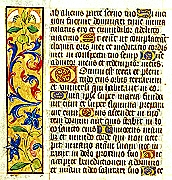Taking up the Psalter
 A letter to some friends by Fr. Samuel F. Weber, O.S.B
A letter to some friends by Fr. Samuel F. Weber, O.S.B
Recently I was asked by some friends not accustomed to using the Psalter, why it might be to their advantage to take it up in their worship and private devotion. This should not be too difficult a matter to explain, I thought at first. Anyone who has listened to Handel’s Messiah is aware of the long Christian tradition of reading the Old Testament as a book of prophecy about Christ. Surely this would be a good place to start.
Christ in the Psalms. Having studied the history of Christian worship and prayer, I knew well the traditions that sang the Psalms in praise of the “Royal Son of David,” the Lord Jesus Christ (e.g., Psalms 2, 109[110], 131[132]), upon whom had been poured the “oil of gladness” (Ps 44[45]:8).1 How the heart thrills when the Messianic Psalms are sung, especially during Advent and Christmastide!
In the Psalms of trouble and suffering, who could not help but recognize Jesus, the Suffering Servant? On the Cross, the Psalms of His People provided the words he needed to cry out to His God (Ps 21[22]), and led Him to commend His life and labors into the hands of the Father (Ps 30[31]:6).2 No wonder these Psalms occur so often during Lent and Holy Week.
And then, how to hymn His resurrection glory? No finer song than Ps 117(118) for praising the “stone rejected” become “the cornerstone,” and celebrating every Sunday as the special day “made by the Lord,” on which rejoicing and gladness are the order of the day (Ps 117[118]:24; see also Mt 21:42, Mk 12:10 and Lk 20:17.; cf. Acts 4:11 and 1 Pt 2:7).
Although He did return to the Father’s glory and is now seated at God’s right hand, Jesus did not forget the loved ones who remained behind. The gift of the Holy Spirit in wind and fire at Pentecost attested: I am with you evermore. Psalter in hand, our Christian ancestors took up the chant on Ascension Day, “God goes up with shouts of joy” (Ps 46[47]:6), and longed for His Spirit-gift in their own lives, praying, “Send forth your Spirit … renew the face of the earth!” (Ps 102[104]:30).3
 Baptism and the Lord’s Supper. As I was mulling over these, and various other possible ways of responding to the request my friends had made, I noticed, stacked in the corner of my bookcase, some postcards, memories of student years in Rome. Among them I came across one of the ancient baptisteries of the city, its walls adorned with dazzling mosaic. There, on the wall opposite the baptismal pool, situated in such a way that, as the newly baptized emerged dripping from the waters, their eyes would immediately fall upon it, was the figure of a youthful shepherd boy. A little lamb was hoisted upon his broad shoulders. I must show this to my friends and tell them how those early Christians newly up from the waters, upon seeing this wonderful work of art, would remember that it was Jesus who had assured them, “I am the good shepherd” (Jn 10:11), and would sing of Him to whom their lives were now irrevocably committed:
Baptism and the Lord’s Supper. As I was mulling over these, and various other possible ways of responding to the request my friends had made, I noticed, stacked in the corner of my bookcase, some postcards, memories of student years in Rome. Among them I came across one of the ancient baptisteries of the city, its walls adorned with dazzling mosaic. There, on the wall opposite the baptismal pool, situated in such a way that, as the newly baptized emerged dripping from the waters, their eyes would immediately fall upon it, was the figure of a youthful shepherd boy. A little lamb was hoisted upon his broad shoulders. I must show this to my friends and tell them how those early Christians newly up from the waters, upon seeing this wonderful work of art, would remember that it was Jesus who had assured them, “I am the good shepherd” (Jn 10:11), and would sing of Him to whom their lives were now irrevocably committed:
The Lord is my shepherd …
near restful waters he leads me …
My head you have anointed with oil …
In the Lord’s own house shall I dwell,
for ever and ever (Ps 22[23]:1, 2, 5, 6)
I picked up another postcard. This time the scene, from the catacombs, was that of a tiny cavern deep under the street level. Perhaps at one time it had been used as a small chapel. Etched on one of its walls, in red the color of clay, was a table. Near it were fish, and two baskets filled with loaves marked with crosses. Vines heavy with clusters of ripe grapes were also near. All was ready for a meal. “Taste and see that the Lord is good!” (Ps 33[34]:9, cf. 1 Pt 2:3). Perhaps my friends would be interested to know that primitive Christians found in this Psalm words most suitable to celebrate Christ present among them in bread broken and a cup shared. Perhaps this traditional communion Psalm would find a place in their own commemoration of the Lord’s Supper.

Leave a Reply